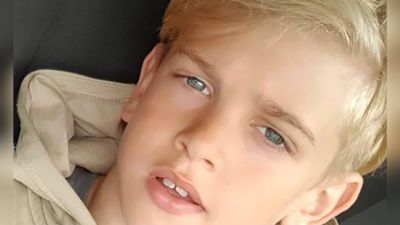Archie Battersbee: Family win right to appeal against judge's ruling that he is dead

The parents of a 12-year-old boy have been given permission to appeal against a court ruling that he is dead.
A High Court judge ruled last week that doctors could lawfully stop treating Archie Battersbee, but in court on Monday lawyers for the family argued that a higher burden of proof should have been used.
They also raised questions over whether the youngster's religion was considered before the ruling from Mrs Justice Arbuthnot on 13 June.
Archie has been in an induced coma since being found unconscious at home on 7 April, but his parents Hollie Dance and Paul Battersbee, from Southend in Essex, believe his heart is still beating and now want Court of Appeal judges to consider the case.
Ms Dance and Mr Battersbee, who are separated, asked Mrs Justice Arbuthnot at a High Court hearing on Monday to give them permission to mount an appeal.
They had to establish they had an arguable or compelling case before a full appeal hearing could be staged.
They said they were delighted with the decision, while the charity supporting them said the time and manner of his death "should be determined by God" and not a judge.
A barrister leading their legal team argued that evidence had not shown “beyond reasonable doubt” that Archie was dead.
Edward Devereux QC said the decision had been made on a balance of probabilities.
He argued that a decision of such “gravity” should have been made on a “beyond reasonable doubt” basis.
Mrs Justice Arbuthnot decided that appeal judges should consider that standard of proof issue.
She said Court of Appeal judges had never considered that standard of proof issue in relation to “declaration of death” cases.
The judge said that issue provided a compelling reason why appeal judges should consider the case.
What were the grounds for appeal?
Mr Devereux argued that Mrs Justice Arbuthnot had failed to take into account Archie’s religious views, and those of his family, as one of nine issues he believed amounted to grounds for appeal.
However, Mrs Justice Arbuthnot dismissed eight of the points - bar the standard of proof issued.
Mr Devereux claimed:
An application for a declaration of death was an exceptional category of case that required the court to apply a standard of proof of beyond reasonable doubt, despite them being civil proceedings;
The court was wrong in extending the common law definition of death to include brain stem death;
In relation to the declaration of death, the court erred by failing to accommodate the religious views of Archie and his family.
Where no brain stem testing was able to be carried out on an individual in a case such as this, the court should start from a presumption that a person is alive;
The court’s assessment of individual matters was flawed;
The court erred in determining that there was a sufficient evidential basis for making a declaration of death.
The court’s analysis of best interests was flawed;
Archie’s court-appointed guardian failed to carry out a proper best-interests analysis;
The court erred in determining that the hearing should take place in private.
A spokeswoman for Archie’s family said relatives are delighted by Mrs Justice Arbuthnot’s appeal decision.
“We were all really convinced that we weren’t going to get permission to appeal,” added Ella Carter.
“So we’re more than happy at the decision – we’re delighted.”
Doctors treating Archie at the Royal London Hospital in Whitechapel, east London, told Mrs Justice Arbuthnot they think the youngster is “brain-stem dead”.
They say treatment should end and think Archie should be disconnected from a ventilator.
Archie’s parents say his heart is still beating and want treatment to continue.
Lawyers representing the Royal London Hospital’s governing trust, Barts Health NHS Trust, asked Mrs Justice Arbuthnot to decide what moves were in Archie’s best interests.
Mrs Justice Arbuthnot heard that Archie suffered brain damage in an incident at home in early April.
Ms Dance said she found her son unconscious with a ligature over his head on 7 April and thinks he might have been taking part in an online challenge. He has not regained consciousness.
Want a quick and expert briefing on the biggest news stories? Listen to our latest podcasts to find out What You Need To Know